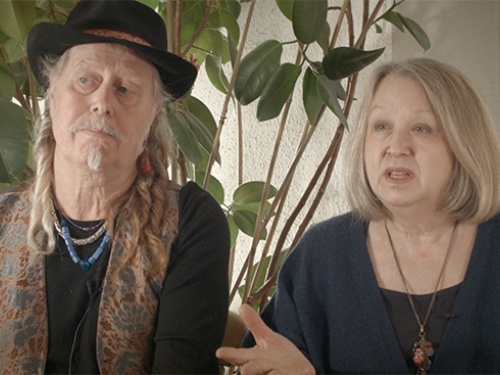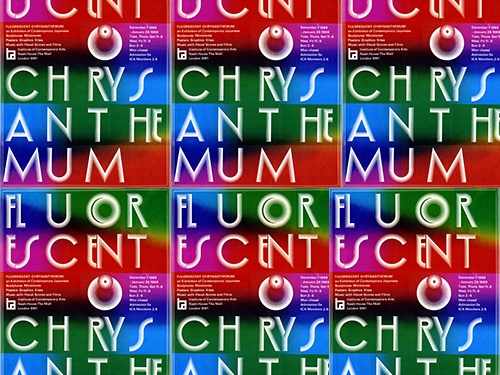Working with Ogawa Pro
An interview with Barbara Hammer
Queer feminist filmmaker Barbara Hammer's film Devotion: A Film About Ogawa Productions is screening as part of our Ogawa Shinsuke and Ogawa Pro season of documentary film by the Japanese collective Ogawa Pro. Here she speaks to Alex Krook about the experience of creating the film.
How and when did you first come across the films of Ogawa Pro and what attracted you to the work and practice of the collective?
I was invited to the Yamagata International Documentary Film Festival originally to show my 1992 feature documentary, Nitrate Kisses, in the competition. The filmmakers were given a tour of the former Ogawa Pro studio which was just an ordinary Japanese house. Ogawa's widow Yoko Shiraishi was there and I was taken with her casual dress and manner; when I saw a 16mm flatbed editing table sitting on a tatami matt I knew I wanted to learn more. I went to Markus [Nornes, who will be giving a lecture as part of the season] and in an intense few hours he filled me in on the history of the group. I've always been interested in group living and visited several 'hippy camps' in Northern California where I used to live, and I felt that the role of women in these groups—both American and Japanese—needed to be studied, revealed and critiqued.
How does the practice and ethos of Ogawa Pro influence your own conception of radical documentary filmmaking?
It doesn't, I have my own approach which is far different from the Ogawa Pro practice and ethos. I usually work alone, and if I work with others I make sure I can get a grant to pay for their labour. My films do not find a singular truth or answer to a question, but rather multiple truths, and I edit in a way that allows each viewer to make their own 'truth' or film. For example, the viewer becomes an anthopologist in my trilogy of queer history Nitrate Kisses (1992), Tender Fictions (1995) and History Lessons (2000).
I gathered and collected intensely for every day and minute of every day while I was in Japan.
Women play an important role in Ogawa Pro's films - the images of women peasants leading the struggle against the police and the stories they tell are unforgettable. In your film you look at the role of women within the collective itself. Can you talk a bit about this?
It was thrilling, I agree, to see the women locking arms and taking the lead in the struggle during the political and social upheavals in Japan. I thought I would find the same feisty risk-taking in the women who were part of the Ogawa Pro group, but instead I found women who were in traditional marriages conditioned to be led by men in their roles, behaviour and ideas. That shouldn't have surprised me as I too was a woman who came of age in the 1950s and was beset with norms of behaviour from childhood through the expected marriage to a man.
The world is indebted to Yumiko Fuseya who wrote daily in her diary about her experiences. In this we have a first-hand original account, a primary document. We would be so grateful if she would publish this diary one day.
My films do not find a singular truth or answer to a question, but rather, multiple truths and I edit in a way that allows each viewer to make their own 'truth' or film.
You have said that you began the interviews with all the people we see in Devotion "not knowing beforehand what I would learn. There were many, many surprises.” Was the final result different from what you had originally envisioned, and did the concept change throughout the process of making the film?
I was naive and without concept. I gathered and collected intensely for every minute of every day while I was in Japan, but it was only when I got home and hired a translator that I began to understand what I had: a trove of individual views that could be woven with a loose weave, enabling audience interpretation and presenting one filmmaker's understanding and further questions.
Has the direct experience of the way that the collective functioned and related to each other changed the way that you now view the films of Ogawa Pro?
I would be happy to see them again and ask myself that question. You in London are lucky as these films are not readily available to the public, and they should be! I think if women had had a larger role, were shooters and editors, we would have very different films from Ogawa Pro. But that is supposition, so now we can simply study and enjoy these historic documents from a revolutionary time in Japanese history. ■
Devotion: A Film About Ogawa Productions screens on 27 November as part of our ongoing season Ogawa Shinsuke and Ogawa Pro: Collective filmmaking and the culture of dissidence.
We are offering a special multibuy deal for the Ogawa Season: book tickets for 2-5 screenings and get them for £9 each, or 6-9 screenings and get them for £8 each.
This article is posted in: Articles, Film, Interviews
Tagged with: Barbara Hammer, Ogawa Pro, Japan, Documentary Film, interview





